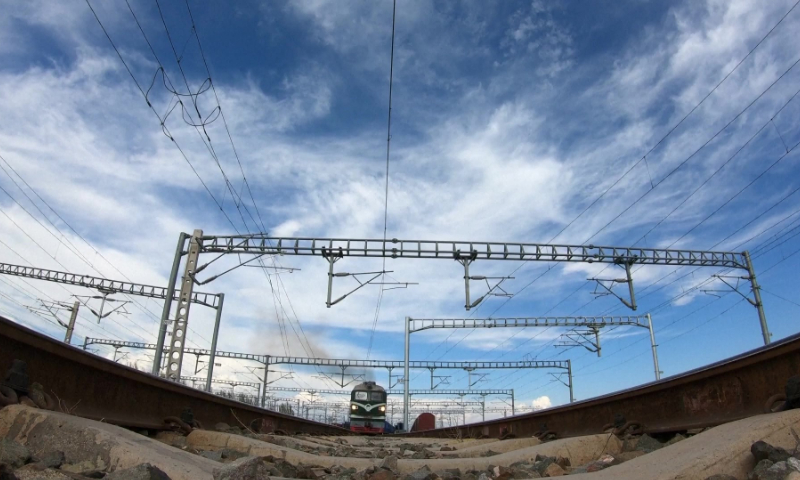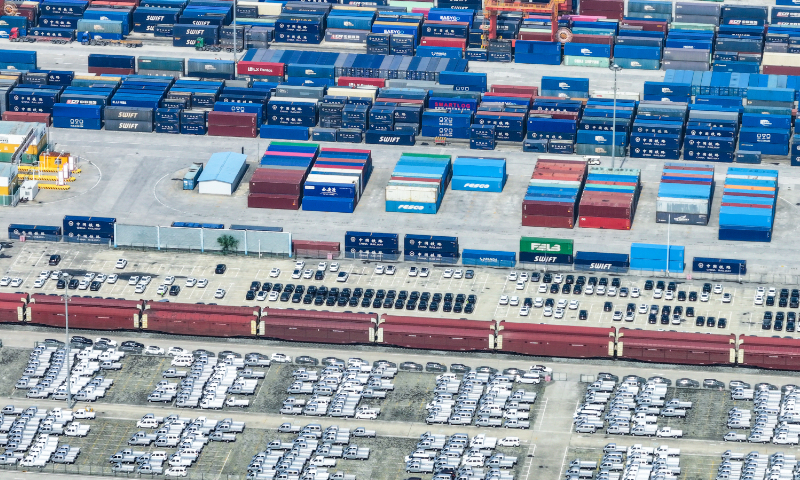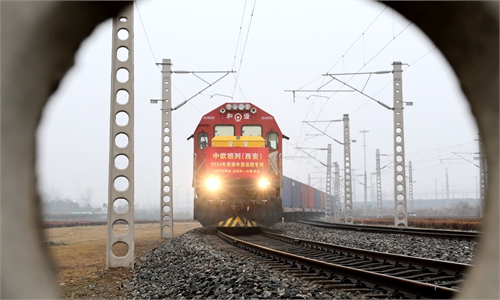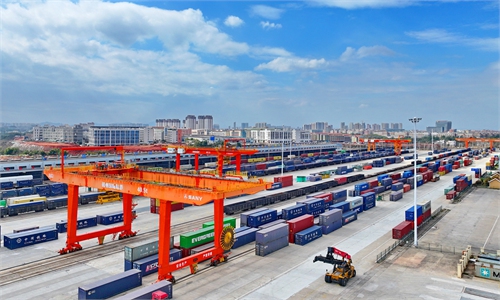
A China-Europe Express Railway cargo train departs from Horgos, Northwest China’s Xinjiang Uygur Autonomous Region to Malaszewicze, Poland, on February 12, 2024. Photo: VCG
A China-Europe freight train, loaded with new-energy vehicles manufactured in China, sounded its horn as it slowly departed from Xi'an International Port Station in Shaanxi Province, Northwest China, bound for Europe.
The departure occurred during the recent eight-day Spring Festival holidays, the Chinese New Year, one of the most important festivals marked each year. Despite the holidays, the freight train service continued uninterrupted, meeting the rising demand for goods at home and abroad.
This bustling railway activity mirrors China's thriving foreign trade. It also underscores the enduring importance of the China-Europe freight train, a flagship project under the Belt and Road Initiative (BRI), in delivering stable cross-continental trade of all types of goods.
Throughout the Spring Festival holidays, China-Europe freight train service has experienced fast growth. Major ports from Manzhouli in North China's Inner Mongolia Autonomous Region to Yiwu in East China's Zhejiang Province reported robust year-on-year increase in cargo transportation, according to local customs data.
Despite geopolitical challenges in the world, cross-border train services have emerged as a rising stabilizer of international trade, with advantages including high reliability, high efficiency and low cost.
Busy delivery
On the night of February 17, Li Dawei, a customs officer at Erenhot Customs in Inner Mongolia, completed inspections and cleared the last freight train during the extended holidays, marking the end of his high-pressure shift of the holidays. The railway line, linking Erenhot port with three capitals - Beijing, Ulaanbaatar, and Moscow - stands as a crucial transportation artery for cross-border commerce.
To ensure uninterrupted goods delivery during the holidays, local customs supported communication and cooperation with rail operators. They implemented 24-hour clearing work, seven days a week, and augmented the use of intelligent supervision tools, including inspection drones, effectively enhancing supervision efficiency, the Global Times learned from Erenhot Customs.
The scene at Erenhot epitomizes the resilient demand for Chinese goods abroad, as well as a rising domestic consumption boom that reinforces import demand.
During the holidays, under the supervision of Yiwu Customs, 68 China-Europe freight trains were dispatched, with an average daily departure of 8.5 trains. This figure nearly doubled compared to the daily average for the whole of 2023, Yiwu Customs told the Global Times on Wednesday, indicating a notable surge of overseas demand for Chinese goods.
At Manzhouli Port, a key transportation hub between China and Russia, local customs oversaw the inspection and clearance of 94 China-Europe freight trains entering and exiting the border, marking a 17.5 percent increase in train numbers from the long Spring Festival holidays in 2023, the Manzhouli Customs said.
What is behind the rapidly growing business is the continuous improvement of the train service since the beginning of the year.
For example, on the 5th day of the Lunar New Year, Xi'an dispatched the nation's first China-Europe freight train marking the Year of the Dragon. The two-way train service between Xi'an and Duisburg, Germany, now takes only 10 days, shortened by two days from a year earlier.
Meanwhile, the variety of goods being transported continues to expand, including high value-added products such as precious metals, aerospace products and ship structural components, Li Pei, a station manager at the Xi'an International Port Station, told the Global Times. The high-value products now constitute around half of the total transported goods for the China-Europe freight train, according to Li Pei.
"The China-Europe freight trains continued to operate according to their regular schedules throughout the Spring Festival holidays, fulfilling the entrusted demands of our customers at home and abroad," Tommy Tan, president of Shanghai EPU Supply Chain Management Co, an industry analyst of China-Europe freight train service, told the Global Times on Wednesday.
Tan said that he maintains an optimistic outlook for this year's train service and is actively working on improving and optimizing multimodal transportation service.

Passenger cars are waiting to be uploaded onto trains for the China-Europe Railway Express at Xi’anguojigang Railway Station in Xi’an, Northwest China’s Shaanxi Province, on September 21, 2023.
Trade stabilizer
In the face of lingering international challenges such as the Red Sea crisis, cross-border freight train services are winning broad acclaim for their reliability, efficiency and low cost.
Several industry insiders said that since the Red Sea crisis, the volume of both imports and exports via the China-Europe freight train has seen a noticeable increase, as more international traders now turn to railway transport as sea shipping is disrupted.
The tensions in the Red Sea highlight the safety advantages of land transport via China-Europe freight trains, Bai Ming, a research fellow at the Chinese Academy of International Trade and Economic Cooperation, told the Global Times.
In terms of efficiency, railways possess a distinct advantage over sea transport. After a decade of high-quality development, China-European freight trains complete their journeys in approximately 12 days, contrasting starkly with the standard sea transit duration of 35 to 45 days.
Regarding cost, rail freight is relatively the same as sea transport, particularly as the price differential diminishes when rerouting via the longer Cape of Good Hope route.
"Presented as an alternative to sea transport, the China-Europe freight train service has gained increasing recognition as an international public goods and trade stabilizer among countries along the route, as reflected by recent busier trade," Bai said.
Seen from the continuous recovery of foreign trade and domestic demand during the Spring Festival holidays, the development momentum of the freight train remains promising for the year, Bai said.


